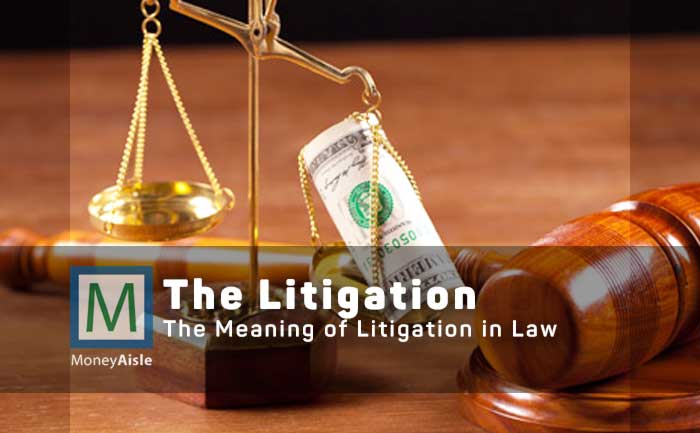Litigation is a term that is commonly used in the legal profession. However, many people are not familiar with what it means and how it works. In this article, we will provide a comprehensive guide to help you understand the meaning of litigation in law.
What is the Meaning of Litigation in Law? Litigation in law is the process of resolving disputes through the court system. It is an essential part of the legal system that provides a means to obtain a resolution to legal disputes. Litigation can be a costly process and emotionally draining for the parties involved. Alternative dispute resolution methods can be used instead of litigation to resolve disputes.
What is Litigation in Law?
Litigation is the process of resolving disputes between two or more parties through the court system. This process involves the filing of a lawsuit by one party against another, followed by a series of legal proceedings that may include discovery, motions, hearings, and trials.
The purpose of litigation is to obtain a resolution to a legal dispute through the court system. Litigation can be used to resolve a wide range of disputes, including those related to contract disputes, employment law, personal injury claims, and family law.
How Does Litigation Work?
The process of litigation begins with the filing of a complaint by the plaintiff, which outlines the legal claims and demands for relief against the defendant. The defendant then has the opportunity to respond to the complaint with their own legal arguments.
The next stage in the process is discovery, where both parties exchange information and evidence related to the case. This may include witness statements, documents, and expert reports.
After the discovery process, both parties may file various motions with the court, including motions for summary judgment or to exclude certain evidence. If the case proceeds to trial, the parties will present their case to a judge or jury, who will then make a decision on the case.
Why is Litigation Important?
Litigation is an essential part of the legal system, as it provides a means for resolving disputes between parties who cannot reach a resolution on their own.
Without litigation, many legal disputes would remain unresolved, leading to ongoing conflicts and potential harm to individuals and businesses.
Litigation also serves to promote the rule of law and helps to ensure that justice is served in legal disputes. By providing a forum for parties to present their cases and arguments, litigation helps to ensure that legal decisions are based on the merits of the case and the applicable laws and regulations.
The Costs of Litigation
Litigation can be a costly process, both in terms of time and money. The costs of litigation can include legal fees, court fees, and expenses related to the discovery process and trial.
In addition, litigation can be emotionally draining for the parties involved, particularly in cases that involve personal injury claims or family law disputes.
Alternative Dispute Resolution
In some cases, parties may choose to use alternative dispute resolution methods instead of litigation.
These methods may include mediation or arbitration, where a neutral third party helps the parties reach a resolution without going through the court system.
Alternative dispute resolution can be a faster and less expensive way to resolve disputes, but it may not be suitable for all types of cases. In some cases, litigation may be the only option to obtain a fair and just resolution to a legal dispute.
Litigation Before Filing a Lawsuit
Before filing a lawsuit, pre-lawsuit litigation is often initiated by the plaintiff. This process involves making demands to the defendant to resolve the issue. If the defendant fails to resolve the issue, the plaintiff can start litigation by hiring an attorney.
Activities by Attorneys
Attorneys typically engage in pre-lawsuit litigation activities, which can include:
- Making formal written demands to the defendant
- Demanding compensation from the defendant
- Filing an eviction notice with a local court
These activities are designed to resolve disputes before a lawsuit is filed and to ensure that the plaintiff’s legal rights are protected. An experienced attorney can provide guidance and support throughout the pre-lawsuit litigation process.
Conclusion
In summary, litigation is a process for resolving legal disputes through the court system. It is an essential part of the legal system, as it provides a means for resolving disputes that cannot be resolved through other means.
While litigation can be a costly and time-consuming process, it serves an important role in promoting the rule of law and ensuring that justice is served in legal disputes.
If you are involved in a legal dispute, it is important to understand your rights and options. Working with an experienced attorney can help you navigate the litigation process and ensure that your interests are protected.
Frequently Asked Questions (FAQs)
Is litigation the only way to resolve legal disputes?
No, litigation is not the only way to resolve legal disputes. Alternative dispute resolution methods such as mediation or arbitration can be used instead of litigation.
How long does litigation usually take?
The length of a litigation process can vary greatly depending on the complexity of the case and the court system’s backlog. Some cases can be resolved in a matter of months, while others may take several years.
Can I represent myself in litigation?
Yes, you have the right to represent yourself in litigation, but it is generally not recommended. Litigation can be a complicated process, and having an experienced attorney can help you navigate the process and protect your interests.
This article is created with the aid of automated technology and then carefully reviewed and verified for accuracy by our professional editors.






